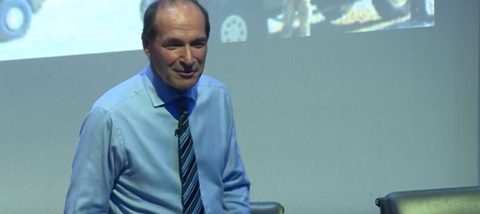
How long do you think we will remain in lockdown?
We have declared war on this virus, but the war is only eight weeks old in the UK. So we need to give the NHS a chance to catch up.
When we've done that, we will be able to relax our social distancing to some degree, to allow the virus to spread a bit more widely while doing all we can to protect the most vulnerable.
So we’ll see degrees of relaxation, and you'll find that some parts of the country will have tighter restrictions than other parts.
What kind of long-term impact do you think this could have on the church?
It's very profound. I often think about St. Paul - the most influential Christian who has ever lived. His ministry has impacted more people than any other Christian. But the only reason for this, is because he was isolated! He was in prison. He was locked away. He became the world's first time warp apostle. He was the first digital discipler, because the words that he wrote were transcribed, and have been over and over again, then they were printed, and then they went online. And today, they're still being broadcast across the world in 100 million different ways every day.
How long has it taken a million church leaders around the world to realise while locked up in solitary confinement, "Oh! I can still use my email, I can still use the web, I can still use YouTube." I want to say: "Come on! These tools have been here waiting for us!" It’s almost as if God has needed to lock the Church up in order to get us to move into the third millennium.
Something quite extraordinary is happening. I wrote a book about this - Cyber Church in 1998. And I predicted all of this back then. As the Church has been imprisoned, as Paul was, we have had to develop the tools that Paul did, and broadcast. So it’s very exciting what's happening, and it's permanent.
I heard this morning of a church in Sweden, that normally has a congregation of 50, but last Sunday, they had a congregation of 1,000.
Spring Harvest is a huge Christian event that usually sees thousands gather. But this week, by going online, they've just had their millionth view. Look at what will happen over the next six months...I predict that those Spring Harvest videos will be seen by another 4 or 5 million people. I also predict that at least a fifth of them will be people who have nothing to do with the Church.
58,000 churches streamed their services live in the UK last Sunday alone. And the videos are still online. All those Easter services that were broadcast are still online. They're going to stay online and could be there still in 20 or 30 years time. And people in any nation of the world, including nations where it isn't legal to talk about the Christian faith, can watch them.
Are we missing physicality? Of course we are. And the Bible commands us to meet. But our God is a God of miracles, and he’s quite capable of working these things out. And so as we gather digitally, there's a sense in which Jesus is present in the midst. These things have extraordinary power, and I think the impact will be very, very significant in the long term.
Do you think this is something that could go on for a year or more?
I'm a futurist who advises governments across the world, in over 50 nations. And I can tell you that 85% of the world doesn't live in the UK or the EU or the US. It lives in emerging markets, the poorest parts of the world. And those nations do not have the same resources.
If you've got a million people living in a slum, you don't have the capacity to self isolate, or to contact trace. And in the majority of the world, we will see coronavirus unfortunately spread rapidly and relatively uncontrolled.
For the UK, we will try to manage this terrible virus very carefully. And we'll do all we possibly can to treat people, and to accelerate vaccine development. But we don't know that vaccines will work. We don't know for sure that having coronavirus will mean that you don't get it again. So we have so much still to learn.
The clinical trials for a vaccine have begun, and there's been various opinions on when it might be available. Do you have any thoughts on that?
We need to be realistic about this. With Ebola, it's took us five years to find a vaccine. We started looking for a vaccine for HIV in 1985. And we are still maybe 10 or 15 years away from developing that vaccine.
What we should have been doing for the last 80 years, is developing a whole range of antivirals that are as effective as when you take antibiotics. We don't have a single antiviral today which is as effective as penicillin was when it was first discovered in 1942.
So we need to be cautious. We can't bet on a vaccine.
Dr. Patrick Dixon is the chairman of Global Change Limited, and the author of a range of books, including Cyber Church, and The Future of (Almost) Everything. He was speaking to Premier's Heather Preston






























